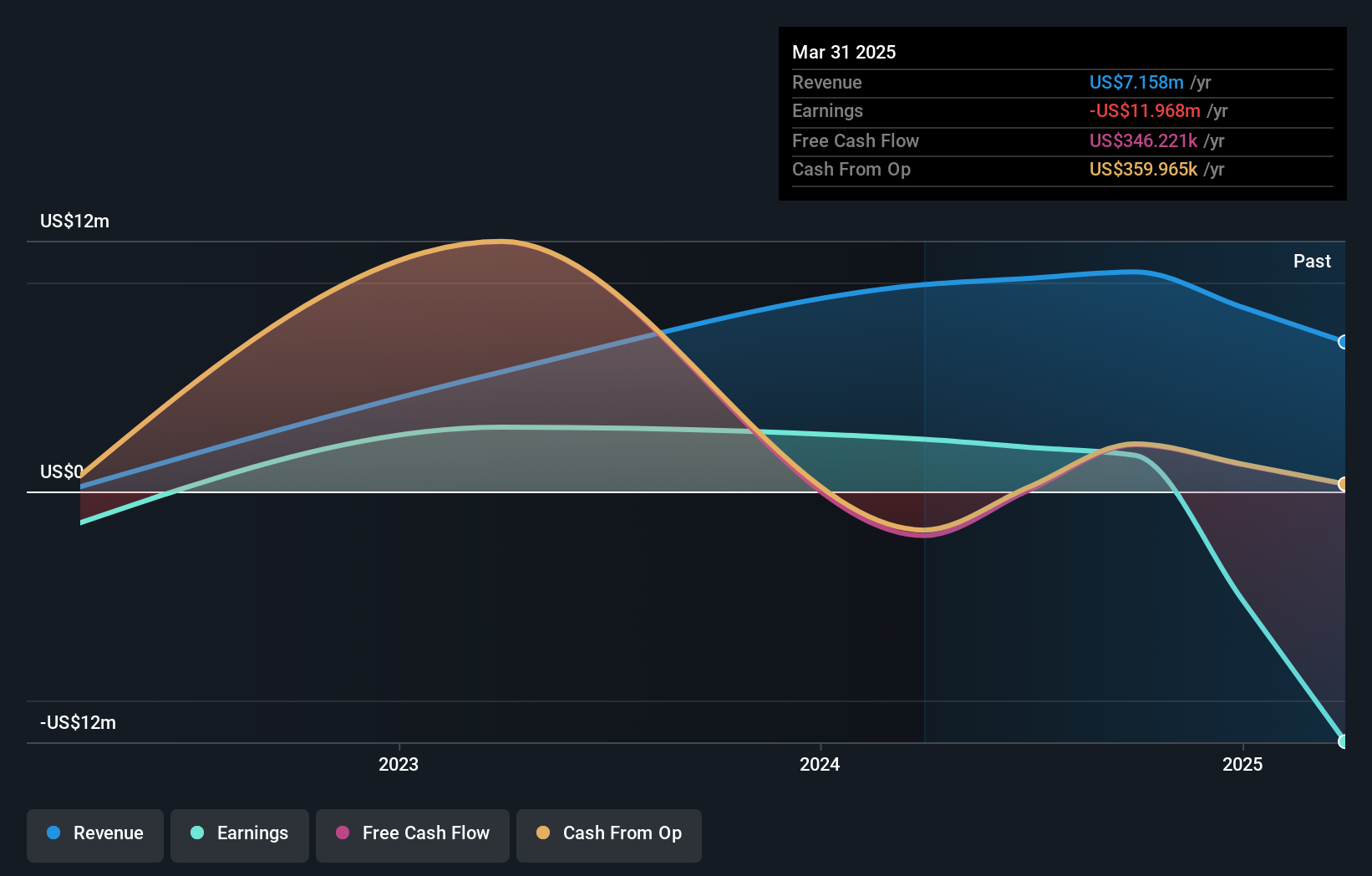- United States
- /
- Capital Markets
- /
- NasdaqCM:WTF
Waton Financial Limited's (NASDAQ:WTF) largest shareholder, Chief Technology Officer Kai Zhou sees holdings value fall by 11% following recent drop
Key Insights
- Insiders appear to have a vested interest in Waton Financial's growth, as seen by their sizeable ownership
- The largest shareholder of the company is Kai Zhou with a 85% stake
- Past performance of a company along with ownership data serve to give a strong idea about prospects for a business
Every investor in Waton Financial Limited (NASDAQ:WTF) should be aware of the most powerful shareholder groups. The group holding the most number of shares in the company, around 85% to be precise, is individual insiders. That is, the group stands to benefit the most if the stock rises (or lose the most if there is a downturn).
And following last week's 11% decline in share price, insiders suffered the most losses.
In the chart below, we zoom in on the different ownership groups of Waton Financial.
Check out our latest analysis for Waton Financial

What Does The Lack Of Institutional Ownership Tell Us About Waton Financial?
Institutional investors often avoid companies that are too small, too illiquid or too risky for their tastes. But it's unusual to see larger companies without any institutional investors.
There are many reasons why a company might not have any institutions on the share registry. It may be hard for institutions to buy large amounts of shares, if liquidity (the amount of shares traded each day) is low. If the company has not needed to raise capital, institutions might lack the opportunity to build a position. Alternatively, there might be something about the company that has kept institutional investors away. Institutional investors may not find the historic growth of the business impressive, or there might be other factors at play. You can see the past revenue performance of Waton Financial, for yourself, below.

Hedge funds don't have many shares in Waton Financial. Because actions speak louder than words, we consider it a good sign when insiders own a significant stake in a company. In Waton Financial's case, its Chief Technology Officer, Kai Zhou, is the largest shareholder, holding 85% of shares outstanding. Meanwhile, the second and third largest shareholders, hold 0.1% and 0.08%, of the shares outstanding, respectively.
While studying institutional ownership for a company can add value to your research, it is also a good practice to research analyst recommendations to get a deeper understand of a stock's expected performance. As far as we can tell there isn't analyst coverage of the company, so it is probably flying under the radar.
Insider Ownership Of Waton Financial
The definition of company insiders can be subjective and does vary between jurisdictions. Our data reflects individual insiders, capturing board members at the very least. The company management answer to the board and the latter should represent the interests of shareholders. Notably, sometimes top-level managers are on the board themselves.
Most consider insider ownership a positive because it can indicate the board is well aligned with other shareholders. However, on some occasions too much power is concentrated within this group.
Our most recent data indicates that insiders own the majority of Waton Financial Limited. This means they can collectively make decisions for the company. That means they own US$215m worth of shares in the US$253m company. That's quite meaningful. Most would argue this is a positive, showing strong alignment with shareholders. You can click here to see if those insiders have been buying or selling.
General Public Ownership
The general public, who are usually individual investors, hold a 15% stake in Waton Financial. While this size of ownership may not be enough to sway a policy decision in their favour, they can still make a collective impact on company policies.
Next Steps:
I find it very interesting to look at who exactly owns a company. But to truly gain insight, we need to consider other information, too. Be aware that Waton Financial is showing 2 warning signs in our investment analysis , and 1 of those is concerning...
Of course, you might find a fantastic investment by looking elsewhere. So take a peek at this free list of interesting companies.
NB: Figures in this article are calculated using data from the last twelve months, which refer to the 12-month period ending on the last date of the month the financial statement is dated. This may not be consistent with full year annual report figures.
Valuation is complex, but we're here to simplify it.
Discover if Waton Financial might be undervalued or overvalued with our detailed analysis, featuring fair value estimates, potential risks, dividends, insider trades, and its financial condition.
Access Free AnalysisHave feedback on this article? Concerned about the content? Get in touch with us directly. Alternatively, email editorial-team (at) simplywallst.com.
This article by Simply Wall St is general in nature. We provide commentary based on historical data and analyst forecasts only using an unbiased methodology and our articles are not intended to be financial advice. It does not constitute a recommendation to buy or sell any stock, and does not take account of your objectives, or your financial situation. We aim to bring you long-term focused analysis driven by fundamental data. Note that our analysis may not factor in the latest price-sensitive company announcements or qualitative material. Simply Wall St has no position in any stocks mentioned.
About NasdaqCM:WTF
Waton Financial
Provides securities brokerage and financial technology services.
Excellent balance sheet with very low risk.
Market Insights
Community Narratives



